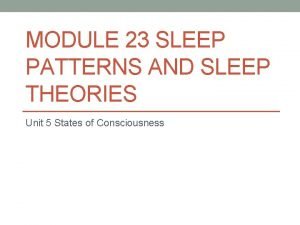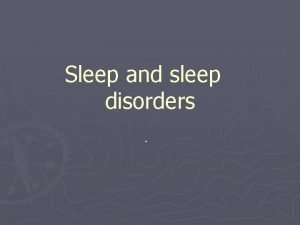Sleep Quality and HealthRelated Quality of Life in


- Slides: 2


Sleep Quality and Health-Related Quality of Life in School- Aged Children With Atopic Dermatitis n n 英文摘要 Abstract Title of Thesis: Sleep Quality and Health-Related Quality of Life in School- Aged Children With Atopic Dermatitis Institution: Graduate Institute of Nursing, Taipei Medical University Author: Liao, Yueh-Hsia Thesis directed by: Chang, Pi-Chen, Ph. D. , Associate Professor Atopic dermatitis (AD) is a chronic inflammatory skin disease that mainly affects children’s quality of sleep and healthrelated quality of life. Research results showed that poor sleep quality in adult chronic patient affected physical function, emotion, and mental health of health-related quality of life. Since there is no research about the correlation between sleep quality and health-related quality of life among school-aged children with atopic dermatitis. The aim of our study was to adopt objective measurement to study the relation between sleep quality and health-related quality of life in school-aged children with atopic dermatitis. This study is a cross-sectional descriptive correlational design. A purposive sampling was used to recruit forty-eight children aged between 9 to 12 with AD and forty- eight children age and gender matched health children. During the research, Actigraphy and sleeping diary were used to record sleep of three days. Children’s Sleep Habits Questionnaire (CSHQ), and Child Health Questionnaire-Parent Form (CHQ-PF 50), Child Health Questionnaire-Children Form (CHQ-CF 87) were used to assess children’s sleep behavior and health-related quality of life. The results of this study were as below: (1) AD children’s sleep time and sleep efficiency were significantly lower than healthy children; then waking minutes, waking episodes, and sleep disturbance were significantly higher than healthy children. (2) AD children’s CHQ-PF 50 scores on physical function, bodily pain/discomfort, parental impact-time and emotional, and psychosocial summary were significantly lower than healthy children. AD children’s CHQ-CF 87 scores on bodily pain/discomfort, behavior, and mental health were significantly lower than healthy children. (3) Sleep lantency, wake minutes, and CSHQ total score explained 37. 2% of the variances of AD children’s CHQ-PF 50 - ‘psychosocial summary ’. Wake minutes explained 9% of the variances of AD children’s CHQ-PF 50 - ‘parental impact-time’. CSHQ total score explained 15. 9 % of the variances of AD children’s CHQ-PF 50 - ‘parental impact-emotional’. CSHQ total score and wake minutes explained 34. 6% of the variances of AD children’s CHQ-PF 50 - ‘family activity’. The results of this study found that quality of sleep mainly affects AD children’s mental demension of health-related quality of life. This study will help health professional understanding of school-age children with AD’s sleep problem, and its effect get further on their health related.



